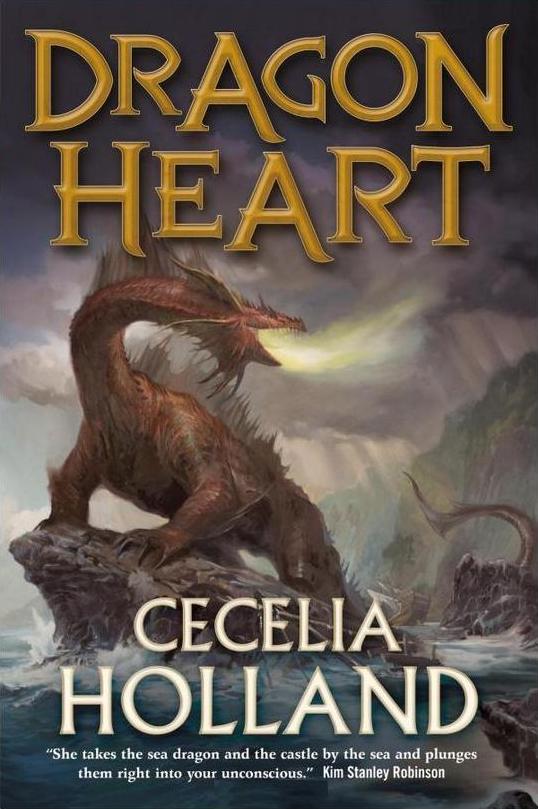A fantasy kingdom under threat, avaricious and grasping scions of an Empire seeking their ambitions and desires, and an implacable dragon come together in Dragon Heart, the first fantasy novel from Cecelia Holland. Holland is best known for a long string of historical fiction novels set across history and time such as The Secret Eleanor, looking at the life of Eleanor of Aquitaine. The Angel and the Sword is set in 9th Century France, a telling of the female knight legend of Roderick the Beardless. Pillar of the Sky details the construction of Stonehenge, and Until the Sun Falls goes deeply into the life of Psin, a General in the Mongol horde in the time after Genghis’ death.
In Dragon Heart, King Reymarro, the King of Castle Ocean, at the edge of the sea, is dead. The grasping, avaricious Empire to the East has seized the opportunity to exert dominion over this last outpost of land in the west. Queen Marioza and her children face the scions of the Empire come to take control of the land and the Castle. These scions themselves have ambitions, plans and desires of their own, and struggle and conflict amongst themselves as well as the royal family. Control of a kingdom like Castle Ocean could be a stepping stone to challenging the Emperor for supremacy, after all, or at least to keep in his good graces.
In the meantime, the incomprehensible but intelligent and passionate Tirza, neglected daughter of the Queen, on a sea journey with her brother, is caught in the destruction of the ship by something rare and dangerous — a sea dragon. Tirza’s incomprehensibility turns out to be no barrier to the dragon, and in a Scheherazade-like fashion, she proves to the dragon to be more useful than just a lunchtime treat. However, this is a greedy dragon, a dragon who quickly considers Tirza his. And thus when Tirza escapes his reach, the dragon is not going to be content to let her return to Castle Ocean unmolested.
The story of the Kingdom at the edge of the Sea and the Empire that seeks to envelop and incorporate it reminded me, historically of the story of the Swiss Confederacy and the Hapsburg Empire in the 14th century. The latter took an opportunity during a period of political instability to attempt to further their domination over the central Swiss plateau, a difficult thing given the terrain. Castle Ocean’s kingdom, with its own mountain passes on the one hand between it and the Empire, and the difficult and treacherous terrain of the seas and waters around it, very much felt like Switzerland in the historical parallel.
It’s a novel very light on the secondary world fantastical elements, aside from the Dragon himself. I found the worldbuilding of the novel at many points frustratingly thin. The Kingdom doesn’t seem to have a name, and neither does the Empire. While they are the only two polities that the narrative and the characters have to deal with, the lack of a name to hang my narrative hat on made them feel, at times, too generic. I was disappointed, but not surprised, to find that there was no map, either. The compactness of the locales and settings in the novel means that a map isn’t truly necessary, but a better sense of scale would have been appreciated.
Given the beauty and gorgeousness of the prose, however, for the most part I forgive the novel these problems. The novel focuses like a spotlight on the characters, their scenes and motivations in an extremely narrow and focused way. Instead of going for the widescreen epic approach to secondary world fantasy, Holland goes for character moments, telling details, and sharp and crisply told scenes and moments that bring the world of Castle Ocean to life. Again and again, in reading the novel, I was struck by just how rendered the characters and locales were. We get a variety of points of view beyond Tirza (as her story is really the heart of the tale), ranging from the other family members of Castle Ocean, to the local inhabitants, to various members of the arriving imperials, from a Sergeant of the guard to the grasping scions of the Emperor’s family.
While not a first novel from Holland, this is a first step into building a world of her own, and I am sure that any subsequent fantasy novels will only improve her skills in writing fantasy. Indeed, I would be willing to read another fantasy novel from her pen. Readers of writers like Mervyn Peake and K.J. Parker might well find Dragon Heart especially to their taste.









